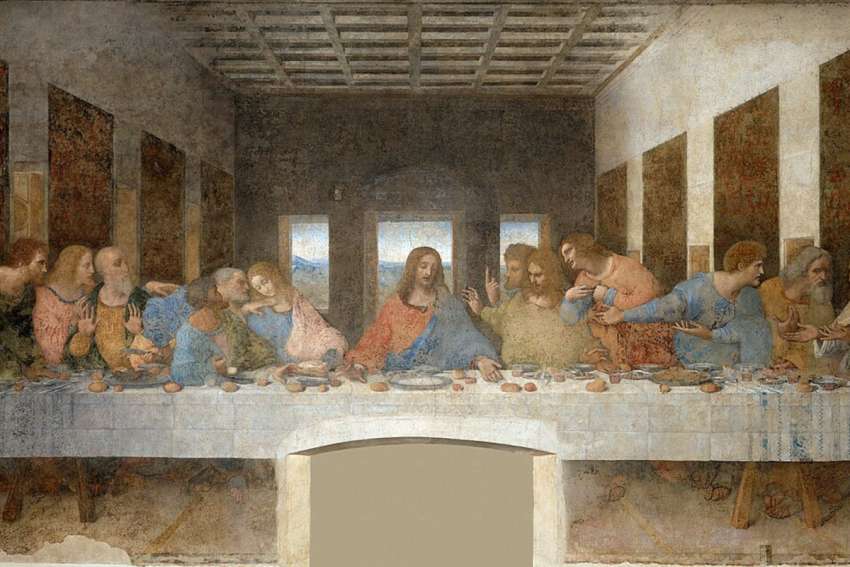Undeniably, political, religious and cultural schisms have become more pronounced in Western civilization over the past decade. Social science studies, media coverage and search engine trends drive home that reality.
Amid agitation over polarization seemingly reaching a fever pitch, Dr. Peter Baltutis of St. Mary’s University explained during his Nov. 14 lecture at FCJ Christian Life Centre in Calgary it is essential to remember humanity has grappled with this complex phenomenon for millennia.
“One of the things that brings me an odd sense of comfort is that polarization is not a new phenomenon,” said Baltutis, an associate professor of history and religious studies. “Let’s go back to the early Church with the Last Supper discourses in John’s Gospel. One thing Jesus prays for is unity. He speaks very clearly to His own time, but I think also to our time: God wants us to be united together, not polarized or divided.”
During his 80-minute talk, the academic delved into the root causes of polarization: the phenomena of sorting, homogenization and intensification. Sorting is people clustering together in groups centred around geographical or identity-based (political, racial, religious, professional, cultural, virtual, etc.) groups. Homogenization is the process of these assemblages becoming increasingly more uniform in what they believe, a concept widely known as groupthink. Intensification is the action of becoming more fervently attached to your chosen clique whilst becoming less willing to engage civilly with factions championing opposing viewpoints.
To penetrate echo chambers and ultimately pave the way for a society that accentuates the ties that bind rather than the differences that splinter, Baltutis said that Catholics, and humanity as a whole, should follow Christ’s example of “crossing over” that He demonstrated during his 33-year earthly ministry. He not only sought out the marginalized, He also brought together people who would have never intersected if not for His influence.
Baltutis alluded to the 2005 book Team of Rivals: The Political Genius of Abraham Lincoln, authored by U.S. presidential historian Doris Kearns Goodwin, as a more recent exemplar of Jesus’ approach to leadership. Famously, the 16th U.S. President filled his cabinet with a diverse cross-section of politicians, many of whom violently disagreed with each other or with “Honest Abe” himself.
Jesus also sought an array of backgrounds when He instituted the apostles, said Baltutis.
“Jesus chose a diverse group of people,” said Baltutis. “Different economic statuses, different political orientations. Exhibit A, Matthew is a tax collector, which means he works as an agent on behalf of the Roman occupying state. Exhibit B, Simon the Zealot. Zealots were a group of people in this period who were actively working to overthrow the Roman government.
“So, these are two very different political orientations,” continued Baltutis. “Jesus did not choose all like-minded people. He called people from diverse backgrounds to come and work together. Yes, if you ask the apostles, you know they were a very dysfunctional group, but yet they were all united by their faith.”
Balutis touted a book called Think Again, The Power of Knowing What You Don’t Know by Adam Grant of the Wharton School of the University of Pennsylvania. One of the revelations in this manuscript is how social scientists concluded following a meta-analysis of 500 studies with over 250,000 participants that interacting face-to-face with members of other groups reduces prejudice by 94 per cent.
“Face-to-face personal encounters are by far the most effective way to stop polarization,” said Baltutis. “Why? Because it humanizes the other. You’re no longer engaging with a bunch of abstract ideas; you’re engaging with real people.”
Quoting his wife Leanne, Baltutis declared that “the world would be a better place if we had more potluck dinners.”
Baltutis said Catholics should imitate Jesus’ bridge-building, wall-crumbling persona by tailoring their message based on what is called for. In Scripture, sometimes He is pastoral, other times He pontificates. There are also plenty of instances when Jesus is an avid listener and questioner, and there are even multiple occasions where He chooses silence.
Regarding Jesus’ curious nature, the Gospel accounts show that Jesus posed 183 questions while only answering four. Baltutis said much unifying can be accomplished by engaging in a Socratic dialogue to gain a deeper understanding of a situation.


